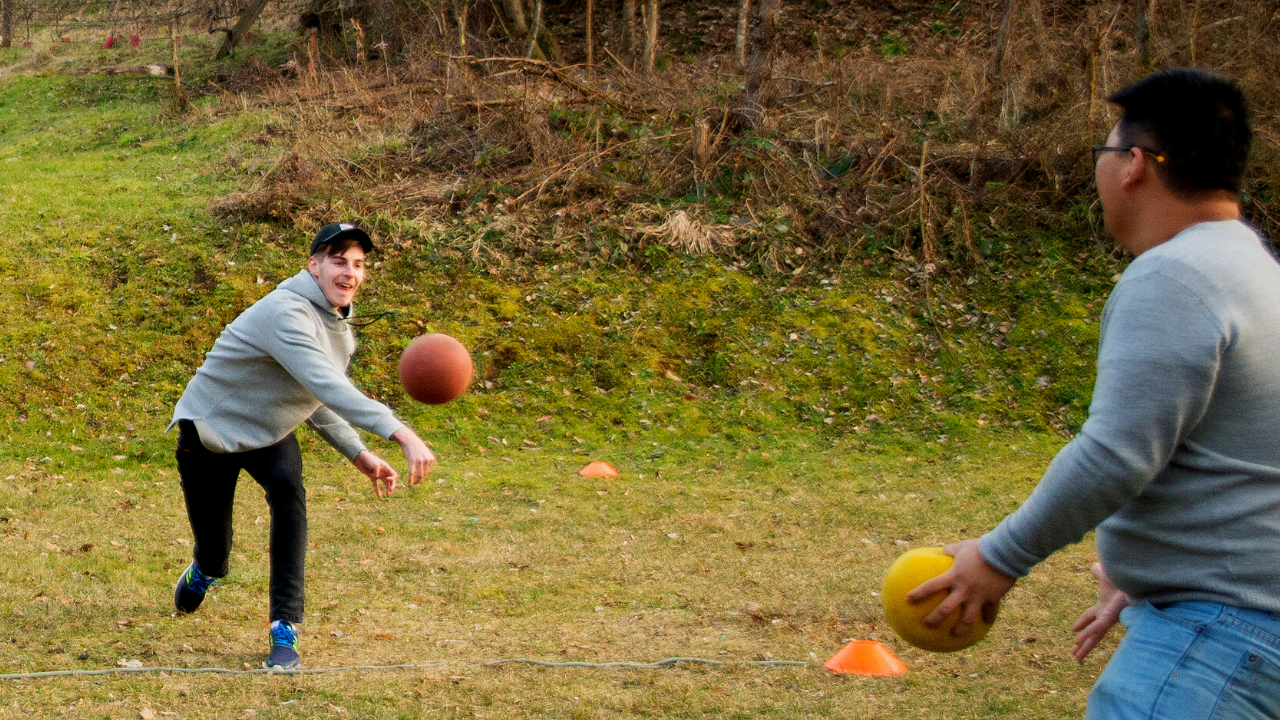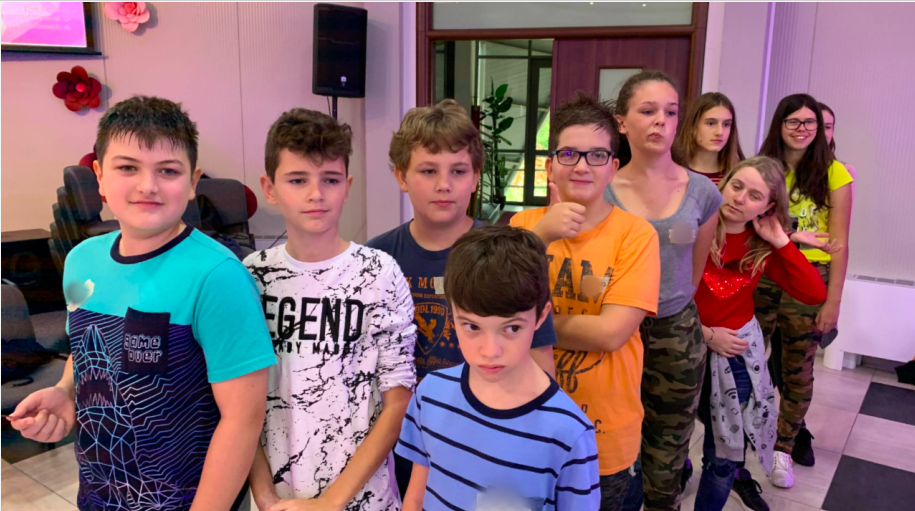5 Christmas Sport&Games Activities
Emily Twigg

Christmas is a time where everyone loves to come together to eat, catch-up and play games with family and friends. Within sports ministry we love to use sport, games and play to share the Christian faith. The story and message of Christmas is not only an important one but is also a fun one we can share especially amongst children and young people.
Below are 5 sporting games and activities which can be used to bring out themes from the Christmas story and can be adapted to be used with both children and youth. Enjoy!
1) Christmas Dodgeball
Below are 5 sporting games and activities which can be used to bring out themes from the Christmas story and can be adapted to be used with both children and youth. Enjoy!
1) Christmas Dodgeball

Set up a dodgeball court as normal and divide your group into two teams. Give each team 5 skittles (or pointed cones) which must be placed within their side of the court. On labels, ask the group to write down four things which are important to them at Christmas (e.g presents, time with family etc.) and stick one label onto each of their skittles. The fifth label should have ‘Jesus’ written on it and placed on the fifth skittle.
Play the game of dodgeball as normal, but instead of trying to hit the players, the teams must try and hit the skittles on the other side of the court. Players must try and defend their cones, however they cannot just stand still in front of a cone. Each time a skittle is hit, it is taken out of the game until none are left, however if the ‘Jesus skittle’ is hit then that team automatically loses instantly.
The idea of this game is that without Jesus, all the other parts of Christmas wouldn’t exist and a greater value should be placed on Jesus at Christmas than the other parts, just like players were probably more careful about defending the ‘Jesus skittle’ than the others.
Which of the labels on the skittles do you think is most important at Christmas?
What do other people value?
Why did the team instantly lose if the ‘Jesus skittle’ was hit?
Do you think people who don’t believe in Jesus should celebrate Christmas if it’s meant to be all about him?
2) Wait for it...
Play the game of dodgeball as normal, but instead of trying to hit the players, the teams must try and hit the skittles on the other side of the court. Players must try and defend their cones, however they cannot just stand still in front of a cone. Each time a skittle is hit, it is taken out of the game until none are left, however if the ‘Jesus skittle’ is hit then that team automatically loses instantly.
The idea of this game is that without Jesus, all the other parts of Christmas wouldn’t exist and a greater value should be placed on Jesus at Christmas than the other parts, just like players were probably more careful about defending the ‘Jesus skittle’ than the others.
Which of the labels on the skittles do you think is most important at Christmas?
What do other people value?
Why did the team instantly lose if the ‘Jesus skittle’ was hit?
Do you think people who don’t believe in Jesus should celebrate Christmas if it’s meant to be all about him?
2) Wait for it...

Split your group into teams and have them line up one behind each other at one end of a room. At the other end of the room have 5 pieces of paper with Biblical prophecies about Jesus on and 5 which have written down Jesus fulfilling the prophecy on them. In the middle of the room set out an obstacle course for each team (the same course but multiplied).
One at a time, teams must send one person out to complete the course and get 1 piece of paper before bringing it back to the team and tagging the next person and so on. Once all 10 pieces of paper are brought back the team must match up the prophecies and the fulfillment.
Ask the team members what they were having to do whilst in the line. Hopefully they will reply ‘waiting’ for the team mate to come back and tag them and to have their turn.
Ask them how they found waiting, was it easy, hard?
Would it have been frustrating if for example you were turned the opposite way and so didn’t know how far away your teammate was?
Check over the matched prophesies to make sure they’re correct. Share with the children that the prophecies were written hundreds of years before Jesus came to earth but were about him and he fulfilled hundreds of them during his lifetime!
Why were people waiting for Jesus to come?
Did they know exactly when he was coming?
Do you think they were frustrated at times when they were still waiting?
The Jews were waiting for a Messiah, the chosen one who would come to save them and Jesus was that person. (If you want to, you can talk about how Christians today are waiting for Jesus to return and to fulfill the prophecies of the second coming).
3) All change (cat and mouse)
One at a time, teams must send one person out to complete the course and get 1 piece of paper before bringing it back to the team and tagging the next person and so on. Once all 10 pieces of paper are brought back the team must match up the prophecies and the fulfillment.
Ask the team members what they were having to do whilst in the line. Hopefully they will reply ‘waiting’ for the team mate to come back and tag them and to have their turn.
Ask them how they found waiting, was it easy, hard?
Would it have been frustrating if for example you were turned the opposite way and so didn’t know how far away your teammate was?
Check over the matched prophesies to make sure they’re correct. Share with the children that the prophecies were written hundreds of years before Jesus came to earth but were about him and he fulfilled hundreds of them during his lifetime!
Why were people waiting for Jesus to come?
Did they know exactly when he was coming?
Do you think they were frustrated at times when they were still waiting?
The Jews were waiting for a Messiah, the chosen one who would come to save them and Jesus was that person. (If you want to, you can talk about how Christians today are waiting for Jesus to return and to fulfill the prophecies of the second coming).
3) All change (cat and mouse)

Divide the group into two or more lines of equal length and stand one line in front of the other.
E.g. If you have 15 young people you could have 5 lines of 3 or three lines of 5 – see below:
xxx
xxx xxxxx
xxx or xxxxx
xxx xxxxx
xxx
Ask all the group to face the same direction and then to hold out their arms, so that they touch the finger tips of those next to them. When you say change, everyone must turn 90° so that now their finger tips are touching with the people who were previously in front and behind them but arenow to their right and left.
Choose 2 young people, 1 to be a cat and the other to be a mouse. The mouse must run up and down the lines created by the groups’ arms and the cat should try and catch them by tagging them.
As the two players run, call out ‘change’ at which point the group must turn 90o. Neither the cat or mouse can run through the group’s arms, only down the lines. Play until the mouse is caught or a good amount of time has passed.
What word was being called a lot? (Change).
What does change mean?
How did change feel for the cat and mouse? (frustrating, worrying, uncertain etc.)
Who has had something change in their life?
Is change easy, difficult or both?
Ask the group whose lives were changed during the Christmas story? E.g.
- Mary as she was suddenly pregnant at a young age and to God’s son!
- King Herod as he was alerted to this new king who he then wanted to kill
- The shepherds who were outcasts, yet valued and invited to this special occasion Etc.
4) Follow the star
E.g. If you have 15 young people you could have 5 lines of 3 or three lines of 5 – see below:
xxx
xxx xxxxx
xxx or xxxxx
xxx xxxxx
xxx
Ask all the group to face the same direction and then to hold out their arms, so that they touch the finger tips of those next to them. When you say change, everyone must turn 90° so that now their finger tips are touching with the people who were previously in front and behind them but arenow to their right and left.
Choose 2 young people, 1 to be a cat and the other to be a mouse. The mouse must run up and down the lines created by the groups’ arms and the cat should try and catch them by tagging them.
As the two players run, call out ‘change’ at which point the group must turn 90o. Neither the cat or mouse can run through the group’s arms, only down the lines. Play until the mouse is caught or a good amount of time has passed.
What word was being called a lot? (Change).
What does change mean?
How did change feel for the cat and mouse? (frustrating, worrying, uncertain etc.)
Who has had something change in their life?
Is change easy, difficult or both?
Ask the group whose lives were changed during the Christmas story? E.g.
- Mary as she was suddenly pregnant at a young age and to God’s son!
- King Herod as he was alerted to this new king who he then wanted to kill
- The shepherds who were outcasts, yet valued and invited to this special occasion Etc.
4) Follow the star

Split your group into small teams and have one person blind-folded. Around the room have coloured stars laid out, a different colour for each team with each team having the same number of stars. E.g. 10 x blue, yellow, red, green etc.
Each group has to navigate their blindfolded team mate to star number 1, being careful of other teams. Once there, they pick up the star and change the blindfolded team member and head for star number 2. Repeat until all teams reach their final star.
In that game what were you following? (Star and voices)
What did the blindfolded player have to do? (Trust and follow – just like the Magi and shepherds)
Did the blindfolded person know where they were heading? (Unlikely, just like the shepherds and Magi)
Was there any danger on the way? (bumping into other groups, listening to the wrong voices)
What danger did the Magi encounter? (Herod who wanted Jesus killed)
Did the Magi listen to Herod and return with information about Jesus? (No, just like you didn’t listen to the ‘wrong’ voices in that game)
Who was the one guiding the star (God), how does he guide us today? By stars?
5) Opposites
Each group has to navigate their blindfolded team mate to star number 1, being careful of other teams. Once there, they pick up the star and change the blindfolded team member and head for star number 2. Repeat until all teams reach their final star.
In that game what were you following? (Star and voices)
What did the blindfolded player have to do? (Trust and follow – just like the Magi and shepherds)
Did the blindfolded person know where they were heading? (Unlikely, just like the shepherds and Magi)
Was there any danger on the way? (bumping into other groups, listening to the wrong voices)
What danger did the Magi encounter? (Herod who wanted Jesus killed)
Did the Magi listen to Herod and return with information about Jesus? (No, just like you didn’t listen to the ‘wrong’ voices in that game)
Who was the one guiding the star (God), how does he guide us today? By stars?
5) Opposites

Start by asking children to jump forwards or jump backwards, whilst also repeating the words. Then change it so that when you say ‘jump forwards’ they repeat the same but just backwards. Then change it so that when you say ‘jump forwards’ they say ‘jump backwards’ and say ‘jump backwards’.
What made it tricky as that game went along?
Was it hard getting your head around doing the opposite?
Were there things you weren’t expecting?
Were there things which happened in the nativity story which you or people then didn’t expect? (Jesus to be born in a stable, Mary being pregnant as a first time mum and young)
Did anything happen which was the opposite (inviting shepherds to a royal birth instead of important people)
Why do you think God chose those people? People we wouldn’t perhaps expect or are the opposite? Why was Jesus born in this way? What does it tell us about God?
You might want to explain how God welcomes and includes everyone, even those society says are less important. He choses us! Jesus coming as a baby to humble beginnings meant that all the people could relate and it showed more greatly God’s power at work. Sometimes God works strangely in our lives too, but Christians believe that God is best and follow and trust him as they live their lives.
What made it tricky as that game went along?
Was it hard getting your head around doing the opposite?
Were there things you weren’t expecting?
Were there things which happened in the nativity story which you or people then didn’t expect? (Jesus to be born in a stable, Mary being pregnant as a first time mum and young)
Did anything happen which was the opposite (inviting shepherds to a royal birth instead of important people)
Why do you think God chose those people? People we wouldn’t perhaps expect or are the opposite? Why was Jesus born in this way? What does it tell us about God?
You might want to explain how God welcomes and includes everyone, even those society says are less important. He choses us! Jesus coming as a baby to humble beginnings meant that all the people could relate and it showed more greatly God’s power at work. Sometimes God works strangely in our lives too, but Christians believe that God is best and follow and trust him as they live their lives.
Drag to resize
About the Author
Emily Twigg is a Strategic Sports Minister with PSALMS (Putting Sport Alongside Local Ministries) and Sport & Play Ministry Trainer at BRIDGE Training.

